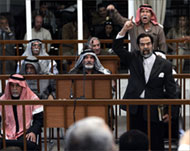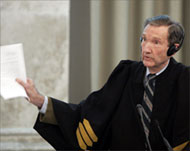First witness testifies in Saddam trial
The first witness to appear in person at the trial of Saddam Hussein has given harrowing testimony against the former Iraqi leader after a walkout by defence lawyers briefly threatened to derail the process.

Ahmad Muhammad Hassim al-Dujaili showed no fear for his security as he testified over the massacre of 148 people from the Shia village of Dujail in 1982, for which Saddam and seven others are on trial.
He was the first witness to appear in person at the court, which has previously held two brief sessions after earlier adjournments and until now been played only videotape testimony from an official just before he died.
The proceedings had earlier been marked by extraordinary scenes when the defence team walked out and Saddam shouted a tirade of abuse.
Legal points
The dispute – over whether Saddam’s foreign lawyers can address the court – prompted a 90-minute recess to solve the problem until Muhammad Rizkar Amin, the presiding judge, agreed to let them speak briefly.
 |
|
Saddam Hussein shouted at the |
As al-Dujaili, a prominent member of the Shia Dawa party, gave his evidence, Saddam made various interruptions from the dock, before being quietened by Amin.
Al-Dujaili testified to the mass arrests of residents and the murder of his neighbours, giving names of those who were killed and listing those he recognised from Saddam’s forces in the Salah al-Din province village.
Testimony
“A friend of mine … was tortured. He was actually killed in front of me and I saw that,” al-Dujaili said.
“People who were arrested were taken to prison and most of them were killed there.
|
“I saw corpses and bodies of our neighbours. They were martyred. Some of them we couldn’t even recognise their bodies” Ahmad Muhammad Hassim |
“I saw corpses and bodies of our neighbours. They were martyred. Some of them we couldn’t even recognise their bodies.”
After the walkout, Saddam stood up and shouted: “Long live Iraq. Long live the Arab nation. Long live Iraq.”
Facing charges of crimes against humanity and torture, Saddam and his seven co-defendants could all be executed if found guilty. They have all pleaded not guilty.
Protection plea
Ramsey Clark, a former US attorney-general, who is representing Saddam, said the fairness of the trial was paramount and demanded better protection for all nine lawyers.
Clark, a controversial figure who has previously represented Slobodan Milosevic, the former Serbian leader, at first complained that five minutes was not enough “for a slow talker, with translation taking half the time”, but then proceeded.
 |
|
Clark reminded the judge two |
Referring to the dire security situation in Iraq, Clark said the trial had a fundamental role to play in either healing or dividing the country.
“There is virtually no protection for the nine Iraqi lawyers and their families who are heroically here to try to protect truth and justice,” he said.
“Without that protection a fair trial is impossible.”
Two defence lawyers have been murdered during the trial.
Najib al-Nuaimi, the former Qatari justice minister, also a defence lawyer, was granted 15 minutes to speak and said that the court, which was formed under US occupation, should examine its own legitimacy before proceeding.
“The charges against my client should be dealt with by an international court,” he said. “If the charges as you put them are mass murder, an international criminal court should look into the charges. An international court is independent.”
Al-Nuaimi said the court was illegal under international law.
“What we have seen is one country attacking another and then enacting a law in stark violation of international norms … this land is becoming more American than Arab,” he said.
Hearings
Officials close to the court are hoping that a full four days of hearings and testimony from 10 witnesses is possible before the court adjourns again in time for Iraq’s parliamentary elections on 15 December.
At least two more witnesses were due to appear on Monday after al-Dujaili’s testimony.
However, only al-Dujaili and one other witness have consented to appear in court and be filmed by television cameras relaying the trial to the world, a US official close to the tribunal has said.
Another six were to appear in court but without being filmed. The final two were expected to speak from behind a screen.
A senior United Nations official told Reuters on Sunday that he was deeply concerned about security surrounding the trial after two defence lawyers were killed, and said he doubted that the proceedings could meet international standards.
Dozens of Iraqis in Saddam’s former home town, Tikrit, demonstrated in support of Saddam and a symbolic protest against him took place outside the Green Zone in Baghdad where the trial is taking place.
For and against
There, a tent housing 18 people who lost relatives under Saddam’s government, one from each of Iraq’s provinces, has been set up. Banners outside read: “We ask for the hanging of Saddam and his aides and we ask for an immediate trial.”
 |
|
Supporters of Saddam protest in |
The whole process has been criticised by Shia Muslims for a slow beginning with a brief opening session on 19 October, followed by a 40-day delay and then a two-hour session on 28 November, and then a week-long adjournment.
The trial has been plagued by problems since its inception, most notably serious security issues. Iraqi security forces said they foiled one fighter group’s plot to fire rockets at the court building.
As well as Saddam and his half-brother, Barzan al-Tikriti, head of intelligence at the time of the massacre, the defendants include Taha Yassin Ramadan, Saddam’s former vice-president, and Awad Ahmad al-Bandar, the head judge of the revolutionary court.